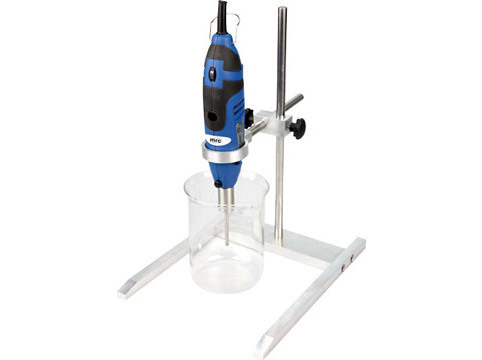| A Homogenizer is used for the homogenization of various types of material, such as tissue, plant, food, soil, and many others. Many different models have been developed using various physical technologies for disruption. |
|

Homogenization is a very common sample preparation step prior to the analysis of nucleic acids, proteins, cells, metabolism, pathogens, and many other targets. High-shear mechanical methods for cell disruption work by placing the bulk aqueous media under shear forces that literally pull the cells apart. These systems are especially useful for large scale laboratory experiments (over 20 mL) and offer the option for large-scale production.
Factors to consider when selecting a Homogenizer
- Wet or Dry Sample
- Sample Size
- Generator Width
- Location of Generator within the Sample
- Speed and Particle Size Reduction
Most Homogenizing processes can be done in 15 - 30 seconds.
If not you may be:
- Using the wrong size generator
- Not locating the generator properly in the container
- Too viscous of a material
Main uses of Homogenizers
-Medical laboratories, life sciences for crushing small samples from animals
-Manufacturers in the cosmetics industry that produce creams.
-Manufacturers of cheeses, ice cream, dairy products and beverages
-Water and wastewater treatments
-Product science
-Extracts and supplements
- Pharmaceuticals
-Chemical Industries
Choice of manual or Benchtop Homogenizer:
When working with test tubes or small tools for short periods of time you can work with a portable homogenizer.
For long-term work it is convenient to work with a regular Benchtop homogenizer.

What to consider when choosing a Homogenizer
-Motor size (Watts)
-Speed control and range (rpm)
-Processing range (mL)
-Sound level (dB)
-Weight and dimensions (kg, mm)
Applications
-Researching new chemicals
-Researching new fertilizers
-Preparing specimens
-Cosmetics and perfumes
-Food ingredient manufacturing
-Pharmaceutical manufacturing
Step-by-Step Guide to Using a Digital Benchtop Homogenizer: General instructions
Preparation of Samples:
- Ensure your sample is placed in an appropriate vessel (tube or beaker) that fits well with the homogenizer’s probe.
- Avoid overfilling the vessel to prevent splashing or loss of material during homogenization.
- If necessary, pre-chill the sample, especially for temperature-sensitive materials like proteins or RNA.
Choosing the Appropriate Probe:
- Select the right probe size for your sample volume. Smaller probes work for smaller volumes, and larger probes for bigger volumes.
- Attach the probe securely to the homogenizer shaft.
Setting Up the Homogenizer:
- Place the vessel with the sample onto the platform or secure it on the benchtop.
- Insert the homogenizer probe into the sample solution. Ensure the probe is submerged sufficiently in the liquid to prevent splashing.
- Adjust the speed settings on the digital interface of the homogenizer.
Starting the Homogenizer:
- Turn on the homogenizer and gradually increase the speed to the desired level, starting low to avoid sudden splashes.
- For most applications, 10,000–30,000 rpm (rotations per minute) is commonly used, but adjust according to the sample's nature.
Homogenizing the Sample:
- Move the probe up and down slowly in the vessel to ensure the entire sample is homogenized.
- For tough or fibrous samples, you may need to run the homogenizer longer or increase the speed gradually.
Monitoring Temperature:
- Homogenizing at high speeds generates heat, which can affect sensitive samples. If necessary, perform the homogenization in an ice bath to keep the temperature controlled.
Stopping the Homogenizer:
- Once the sample is adequately homogenized, lower the speed gradually and then turn off the machine.
- Remove the probe from the sample and clean it immediately after use to avoid cross-contamination between samples.
Cleaning and Maintenance:
- Detach the probe and clean it using a suitable cleaning agent (e.g., distilled water, alcohol, or a detergent solution).
- Dry the probe and store it in a clean area to prevent damage.
MRC Homogenizers
MRC specializes in the supply and manufacture of homogenizers in the homogenization of various types of material